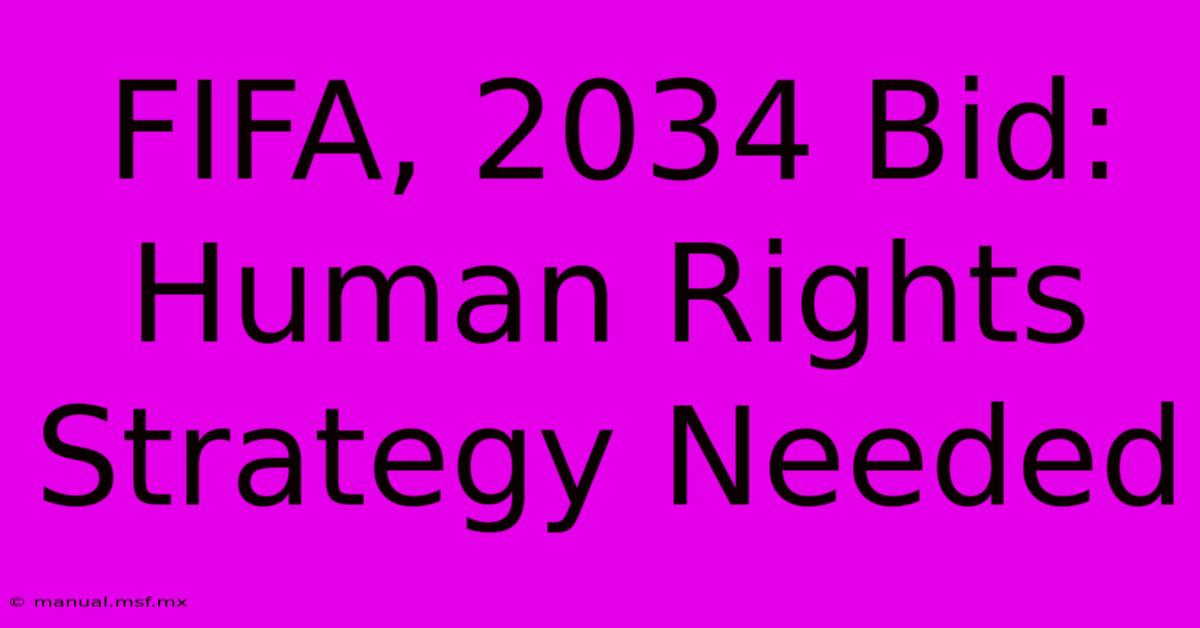FIFA, 2034 Bid: Human Rights Strategy Needed

Discover more detailed and exciting information on our website. Click the link below to start your adventure: Visit Best Website. Don't miss out!
Table of Contents
FIFA, 2034 Bid: Human Rights Strategy Needed
Are human rights a key factor in FIFA's decision-making? The 2034 FIFA World Cup bids are in, and human rights must be a central part of the process. Editor Note: This article explores the critical need for a robust human rights strategy in FIFA's 2034 World Cup bid evaluation process.
The 2034 World Cup is a massive opportunity for the winning country, but also a huge responsibility. FIFA, as the governing body, has a duty to ensure that the event is held in a way that respects human rights. The selection process must include a thorough assessment of each bid's human rights record.
Our analysis delves into why human rights are essential for a successful 2034 World Cup. We examine the potential impacts of the tournament, the importance of transparency and accountability, and the key considerations for a comprehensive human rights strategy.
Key Takeaways:
| Key Aspect | Description |
|---|---|
| Human Rights Impacts | Positive and negative impacts on diverse groups within the host country. |
| Transparency and Accountability | FIFA's commitment to open and transparent processes regarding human rights concerns. |
| Stakeholder Engagement | Collaboration with local communities, human rights organizations, and relevant stakeholders. |
This in-depth guide provides a comprehensive overview of the human rights considerations for the 2034 FIFA World Cup. It examines the crucial aspects of human rights, their impact on the tournament, and the role of FIFA in ensuring a responsible and ethical bidding process.
Human Rights in the Spotlight
The 2034 World Cup presents a unique opportunity for the host country to showcase its commitment to human rights. However, the event can also have significant impacts on various groups, including:
- Workers: Concerns about labor rights, fair wages, and safe working conditions for construction and event workers.
- Indigenous Communities: Respecting land rights, cultural heritage, and the potential for displacement or disruption.
- LGBTQ+ Individuals: Ensuring safety and inclusivity for LGBTQ+ individuals in a country with varying levels of acceptance.
- Freedom of Expression: Safeguarding the right to express dissenting opinions or criticism during the tournament.
FIFA must prioritize human rights in its evaluation process. This means conducting thorough due diligence, engaging with relevant stakeholders, and developing a clear human rights strategy for the tournament.
Transparency and Accountability
FIFA must be transparent and accountable in its human rights approach. This means:
- Publicly releasing human rights reports: Providing detailed assessments of each bid's human rights record.
- Engaging with human rights organizations: Seeking input and advice from international and local experts.
- Establishing mechanisms for reporting and redress: Creating avenues for complaints and ensuring that grievances are addressed.
Transparency builds trust and accountability. It demonstrates FIFA's commitment to using its global platform to promote human rights.
Stakeholder Engagement
FIFA must engage with all relevant stakeholders to ensure a human rights-respectful tournament.
- Local Communities: Collaborating with communities to address their concerns and ensure their participation in the event.
- Human Rights Organizations: Consulting with human rights experts to develop effective human rights strategies.
- Government Officials: Working with the host country government to implement human rights safeguards.
- The Media: Engaging with the media to raise awareness about human rights issues and promote accountability.
Engaging with stakeholders fosters dialogue, collaboration, and ultimately, a more inclusive and responsible tournament.
Conclusion
The 2034 FIFA World Cup represents a significant opportunity to promote human rights. By prioritizing transparency, accountability, and stakeholder engagement, FIFA can ensure that the tournament upholds the highest standards of human rights and leaves a positive legacy for the host country and the world.
Moving forward, FIFA must demonstrate a strong commitment to human rights. This commitment should extend beyond mere statements and translate into concrete actions during the bidding process and the event itself. The legacy of the 2034 World Cup will be determined by its impact on human rights and the extent to which it upholds the fundamental rights of all individuals.

Thank you for visiting our website wich cover about FIFA, 2034 Bid: Human Rights Strategy Needed. We hope the information provided has been useful to you. Feel free to contact us if you have any questions or need further assistance. See you next time and dont miss to bookmark.
Also read the following articles
| Article Title | Date |
|---|---|
| Bitcoin 90 000 Dollar Marke Erreicht Inflation Treibt An | Nov 14, 2024 |
| Io Canto Generation Vincono Namite Selvaggi | Nov 14, 2024 |
| Mike Tyson Vs Jake Paul Predictions Du Combat | Nov 14, 2024 |
| Homebase Deal Threatens 2 000 Jobs | Nov 14, 2024 |
| Gaetz Le Nouveau Ministre De Trump | Nov 14, 2024 |
| Wembanyama 50 Points Records Et Show Xxl En Video | Nov 14, 2024 |
| Explosion En Tribunal Supremo De Brasil Un Muerto Evacuacion | Nov 14, 2024 |
| Winnipeg Hospital Wrong Leg Amputation | Nov 14, 2024 |
| Goldbergs Financial Disclosure Sparks Outrage | Nov 14, 2024 |
| Trumps Surprise Cabinet A Look Inside | Nov 14, 2024 |
